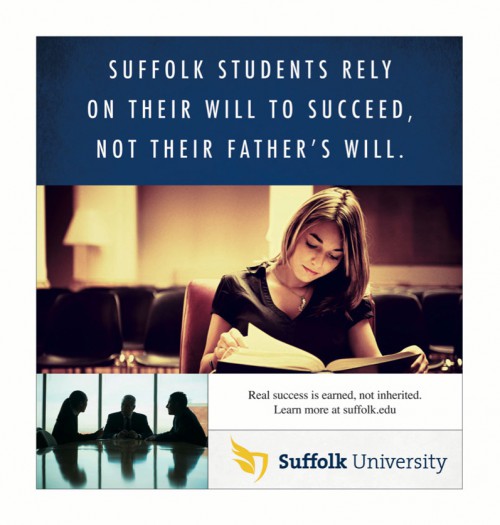As the school welcomes Dr. Norman Smith, the new president has said goodbye to the university’s marketing campaign set in place by former president James McCarthy with the advertising company Devito/Verdi.
 The first time I saw an advertisement about Suffolk, I wasn’t even aware that my school had an active campaign.It was a poster displayed on the Red Line toward Ashmont. A girl was pictured reading a book with the caption, “Suffolk students rely on their will to succeed, not their father’s will,” below her. My initial reaction was that it was cleverly put, but it was sending a negative message overall. Any university should focus its energy and funds towards sending only a positive image of itself.
The first time I saw an advertisement about Suffolk, I wasn’t even aware that my school had an active campaign.It was a poster displayed on the Red Line toward Ashmont. A girl was pictured reading a book with the caption, “Suffolk students rely on their will to succeed, not their father’s will,” below her. My initial reaction was that it was cleverly put, but it was sending a negative message overall. Any university should focus its energy and funds towards sending only a positive image of itself.
The fact that this ad is trying to illustrate that students who attend Suffolk are self-driven rather than driven by their inheritance is more or less creating a negative image of the students themselves. The ad is indirectly referencing how Suffolk students are supposedly different from others in the Boston area, when in reality the tuition of Suffolk nearly ties with schools like Boston University and Emerson College. Because tuition costs are so similar on paper, the ad makes students look like they are taking a false sense of self-righteousness, that we want the world to look at us and think we are different.
Other advertisements from this campaign that portrayed an almost ignorant image were posters that read, “For students who believe college is a privilege, not a birthright,” and “Can someone climb the ladder of success in something other than penny loafers? The short answer: absolutely.”
These posters desperately want their readers to think that Suffolk students are definitely not the stereotypical wealthy and unwitting young adults that seek higher education at institutions like Harvard or MIT.
In order to understand their marketing perspective, Devito/Verdi needed to be examined. Like their print advertisements for Suffolk, their website was also short, simple, and to the point. One of their latest campaigns, with Tribe Hummus, portrays a male and female eating the hummus after what they refer to as “native mating.” Some people might see this as inappropriate. Sure, it makes sense to link the two biggest selling methods together, food and mating, but did Tribe Hummus not want to be eaten at casual family parties?
It seems that Devito/Verdi’s method to get people to remember their advertisements is to portray their client’s company in a somewhat provocative way. This is certainly not a new method of advertising, but this begs the question as to how far Suffolk is willing to go. Advertising in this way wouldn’t guarantee that a person who sees the ad would enroll at the university that day, but Suffolk wanted to be looked at in a different light. The point obviously was to get Suffolk back on the radar after years of advertising silence – whatever it took.
I agree with Smith’s decision to cancel the fairly new advertising campaign. Instead of the university sending a message of what we are not, the message needs to be about the good things we are as a community. To get the school the recognition it deserves, we would need to pair with an advertising agency that effectively takes on a positive meaning.














